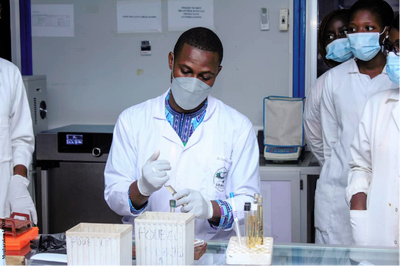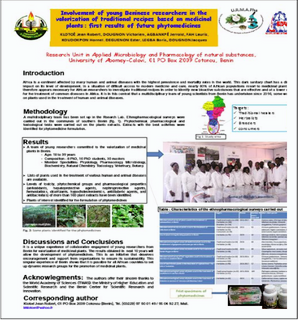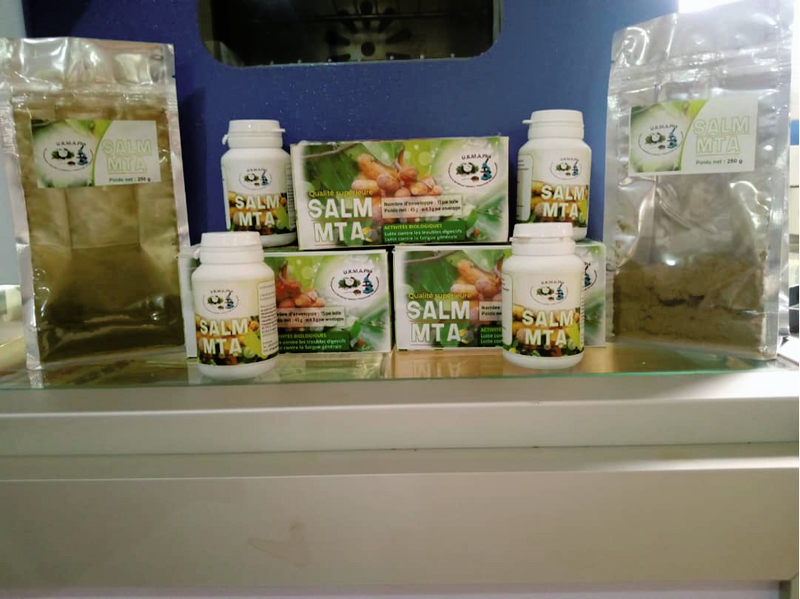Combatting antimicrobial resistance in Benin
The Research Unit in Applied Microbiology and Pharmacology of Natural Substances at the University of Abomey-Calavi, Benin is a major centre for research and the fight against antimicrobial resistance. Headed by Dr Dougnon, the team proposes an innovative approach based on medicinal plants to offer alternatives to antibiotics.
Please introduce yourself and your research

I was awarded my PhD in Environmental and Health Sciences in 2013 after a MSc degree in Biomedical Sciences in 2011. Currently, I am working as a Senior Lecturer in Microbiology at the Polytechnic School of Abomey-Calavi, University of Abomey-Calavi in Benin. One of my main research topics is using medicinal plants against infectious diseases to contribute to the fight against antimicrobial resistance in Africa.
The Research Unit in Applied Microbiology and Pharmacology of Natural Substances is part of the Laboratory of Research in Applied Biology of the Polytechnic School of Abomey-Calavi, University of Abomey-Calavi. Its main vision is to be a national unit of excellence where scientists work together to find solutions to health and environmental problems of major importance in Benin, Africa and the world. In line with this vision, its mission is to conduct cutting-edge basic, biomedical and public health research relevant to the needs of populations.
The Research Unit is made of three research departments: The Department of Microbiology, the Department of Molecular Biology and the Department of Pharmacology. The Department of Microbiology works on the evaluation of the microbiological quality of various products, the study and understanding of microbial pathologies and research on probiotics. The Molecular Biology department is interested in the detection of virulence factors of microbial species, the detection of resistance factors of microbial species, the use of molecular tools for a better understanding of non-communicable diseases and the production of bioactive substances. Finally, the department of Pharmacology deals with the exploration of medicinal and toxicological properties of plants and the production of phytomedicines.
Where did your interest in plants that are active against pathogenic bacteria come from?
This interest came from the social realities of Benin and Africa. In the Republic of Benin, data from the Ministry of Health has shown that the diseases most frequently encountered in consultations and hospitalisations are malaria, acute respiratory infections, other gastrointestinal affections, trauma, anemia, diarrhea, other dermatological affections, arterial hypertension, lower abdominal pain and osteo-articular affections. Unfortunately, there is no formal universal health coverage for the Beninese population, with a lack of access to optimal quality healthcare particularly for the poorest populations.
In infectious disease management, the limited access to conventional antibiotics is compounded by the problem of antimicrobial resistance. Antimicrobial resistance constitutes a public health problem, given the handicap it represents for management of infectious diseases in Benin. What do people do to treat themselves? They use medicinal plants as a priority. According to data from the World Health Organization, 8 out of 10 Africans use medicinal plants to treat themselves. And often these treatments are effective. Several dozen scientific studies performed in Benin have shown the use of many medicinal plants in the treatment of infectious diseases. Unfortunately, this use remains strictly empirical and without any scientific basis, which creates barriers to ensuring the safety of these medicinal plant products. This is the main reason for my lab’s interest in medicinal plants. Our lab aims to produce scientific data on the antimicrobial activity, chemical characteristics, toxicity and mechanism of action of medicinal plant extracts used in Benin. The research unit also uses its expertise in the field of galenics to develop phytomedicines from plant extracts that show interesting activity.
What has been the contribution of your unit to the enhancement of plants that are active against pathogenic bacteria?
The contribution of the research unit on the enhancement of plants that are active against pathogenic bacteria can be presented in three main points: scientific work, scientific grants, formulation of phytomedicines:
Scientific productions

Our lab has produced abundant scientific data on medicinal plants to be used in the fight against pathogenic bacteria. The research works include ethnobotanical or ethnopharmacological surveys, intended to explore the practices of local populations on the traditional management of infectious diseases by medicinal plants, the chemical characterisation of medicinal plants to identify bioactive compounds with antimicrobial properties, the evaluation of the antimicrobial properties of extracts of medicinal plants, the evaluation of the toxicity of the active extracts on bacterial strains, with a view to determining the safety of the extracts, research and exploration of the mechanism of action of the extracts of plants active on microbial strains. About 50 scientific works were published between 2016 and 2021.
Among them, we can cite the antimicrobial activity of a number of plant essential oils on oral micro-organisms. We have also assessed the anti-Salmonella activity of the aqueous and ethanolic extract of Senna siamae, an evergreen tree which is often used in the traditional management of salmonellosis in Benin and evaluated of the in vivo anti-Salmonella activity of Uvaria chamae, Lantana camara and Phyllantus amarus. We have surveyed plants sold in traditional markets in south Benin to treat candidiasis in traditional markets in southern Benin, and surveyed some Togolese plants used in the treatment of infectious diseases.
We have evaluated the antibacterial activity of extracts of several Beninese plants, and in some cases, moved on to test their toxicity in larvae and in lab rats. The knowledge of farmers and traditional therapists has allowed us to investigate traditional treatments of salmonellosis, and study the chemical composition, cytotoxicity and antibacterial activity of selected extracts of local vegetables used in the treatment of bacterial diarrhea in southern Benin communities.
Grants
Our lab has been awarded several grants which have made it possible to deepen research work in the field of the valorisation of natural substances derived from medicinal plants for the fight against antimicrobial resistance.
Innovation in the field of phytomedicines
The research unit has developed several phytomedicines for the fight against microbial infections. One of the latest phytomedicine innovation is called "SALM-MTA". It is a phytomedicine used in Benin against salmonellosis and available in three galenic forms: capsule, tea and veterinary powder.

What are the main difficulties that you encounter?
The main difficulties encountered are about accessing national funds. We also faced the capacity-building issues among young Beninese’s scientists. However, some actions have been initiated to address them.
How do you estimate the impact of your work on Benin and the African continent over the next five years?
The unit's strategic plan projects it to 2026 as a world-class centre of excellence specialising in the fight against antimicrobial resistance, both in diagnosis, surveillance and in proposing alternatives to antibiotics. With this last point, the development of phytomedicines resulting from research work on medicinal plants will make it possible to respond to the problem of the shortage of antibiotics, which will allow effective management of infectious diseases in Africa and in the world.
